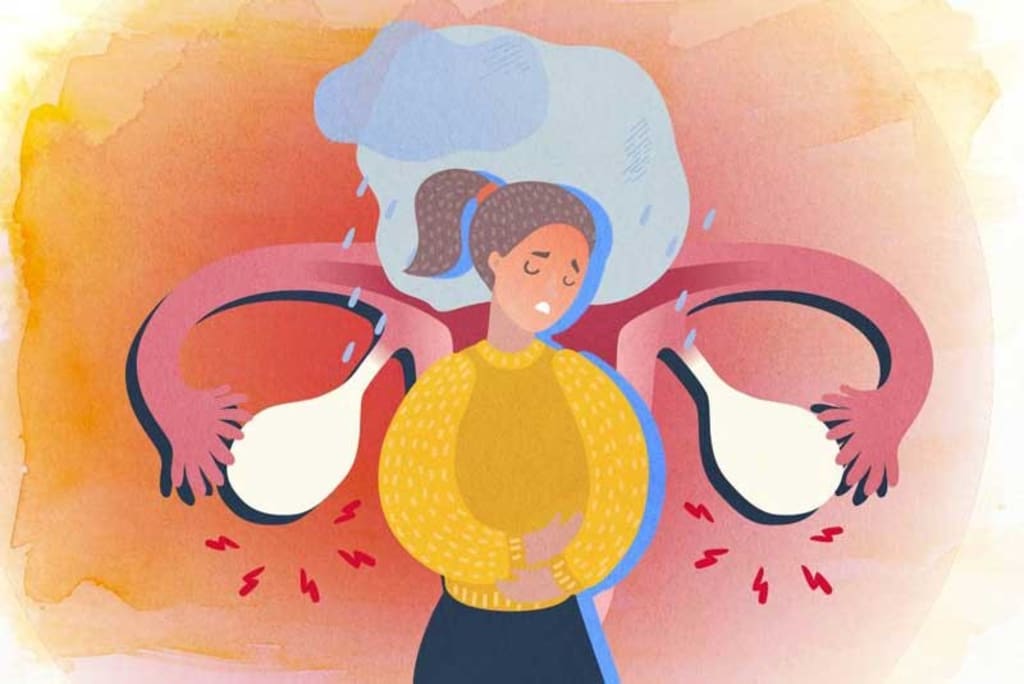What's Premenstrual dysphoric disorder?
The illness's signs, causes, and treatment

Premenstrual Dysphoric Disorder (PMDD) is a severe and often misunderstood condition that affects some women in the days leading up to their menstrual period. It is a more extreme form of premenstrual syndrome (PMS), characterized by a wide range of emotional and physical symptoms. PMDD can significantly impact a woman's quality of life, relationships, and daily functioning. This article delves into the key aspects of PMDD, its symptoms, causes, diagnosis, and available treatments.
Symptoms:
A range of severe mental and physical symptoms that are usually present for two weeks prior to menstruation and go away a few days after the period begins are the hallmarks of PMDD. Typical emotional symptoms consist of:
Mood Swings: Individuals with PMDD often experience intense mood swings, including severe irritability, anger, sadness, and even anxiety or panic attacks.
Depression: Many individuals with PMDD experience depressive symptoms that can be so severe that they interfere with daily functioning and even lead to thoughts of self-harm.
Severe Anxiety: Anxiety symptoms can be debilitating, often leading to feelings of restlessness, tension, and an impending sense of doom.
Cognitive Disturbances: PMDD can affect cognitive functions, leading to difficulty concentrating, memory lapses, and a "foggy" or disoriented feeling.
Physical Symptoms: Physical symptoms may include breast tenderness, bloating, headaches, joint and muscle pain, and fatigue.
These symptoms cause a great deal of distress and interfere with daily living; they are not just an exaggerated version of the normal PMS.
Causes:
Although the precise origin of PMDD is yet unknown, hormone variations are thought to be a major contributing factor. Changes in progesterone and estrogen levels during the menstrual cycle are thought to be connected to PMDD. Certain women can be particularly vulnerable to these changes in hormones, which can result in the extreme emotional and physical manifestations linked to PMDD.
Other factors, such as genetic predisposition, neurotransmitter imbalances in the brain (particularly serotonin), and environmental factors, may also contribute to the development of PMDD. It's important to note that while the hormonal fluctuations are a major factor, they alone do not explain the entirety of PMDD may also develop as a result of other variables, including a genetic predisposition, neurotransmitter imbalances in the brain, particularly with regard to serotonin, and environmental factors. It is noteworthy that although hormonal variations play a significant role, the intricate etiology of PMDD cannot be fully explained by them alone. PMDD's complex etiology.
Diagnosis:
Given that PMDD symptoms frequently coexist with those of other mental health issues including anxiety and sadness, diagnosing PMDD can be difficult. When diagnosing a patient, a healthcare professional will usually consider certain factors, such as:
The timing of symptoms: PMDD symptoms consistently occur in the two weeks before menstruation and significantly improve within a few days after the period starts.
Severity of symptoms: Symptoms are severe and disrupt daily functioning and quality of life.
Confirmation of the pattern: Keeping a symptom diary for a few months can help establish the pattern of recurring symptoms.
Healthcare providers may also perform physical exams and blood tests to rule out other medical conditions that might be causing similar symptoms.
Treatment:
Managing PMDD often involves a combination of lifestyle changes, therapy, and medication. Treatment options include:
Lifestyle modifications: Engaging in regular exercise, getting enough sleep, reducing stress, and maintaining a healthy diet can help alleviate some PMDD symptoms.
Cognitive-behavioral therapy (CBT): Therapy can be effective in helping individuals learn to manage their emotions and cope with PMDD symptoms.
Medications: Selective serotonin reuptake inhibitors (SSRIs), a class of antidepressants, are often prescribed to alleviate emotional symptoms. Hormonal birth control methods, such as oral contraceptives, may also help regulate hormonal fluctuations.
Supplements: Some women find relief with certain supplements, like calcium, magnesium, and vitamin B6.
Gonadotropin-releasing hormone agonists (GnRH agonists): In severe cases, where other treatments are ineffective, these medications can temporarily induce a state similar to menopause to suppress hormonal fluctuations.
It's important to note that treatment plans should be tailored to each individual's specific needs, and what works for one person may not be effective for another.
Let's sum up by saying that some women experience the severe illness known as Premenstrual Dysphoric Disorder (PMDD) during their menstrual cycle. It is characterized by intense physical and emotional symptoms that can significantly affect a person's quality of life. Hormonal changes, genetics, and neurotransmitter abnormalities are thought to be involved in PMDD, while the precise causes are still unknown. Although diagnosis can be difficult, it is based on a pattern of severe symptoms that corresponds with the menstrual cycle.
Modest lifestyle adjustments, counseling, and medication are often used in conjunction for the most effective management of PMDD. Many women with PMDD can have an enhanced quality of life and find relief from their symptoms with the correct treatment. To provide assistance and proper care to persons afflicted by PMDD, it is imperative to have knowledge, comprehension, and empathy for those who experience this condition.
About the Creator
Ronish Nakarmi
Give your day boost of creative writing






Comments
There are no comments for this story
Be the first to respond and start the conversation.